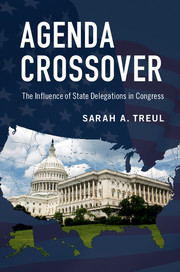Book contents
- Frontmatter
- Dedication
- Contents
- List of Figures
- List of Tables
- Acknowledgments
- 1 State Delegations in Congress
- 2 A History of State Delegations
- 3 State Delegations and Legislative Behavior in the House
- 4 State Delegations and Legislative Behavior in the Senate
- 5 Agenda Crossover in the U.S. Congress
- 6 Rethinking State Delegations in Congress
- Appendix A Interviews
- Appendix B Wisconsin's Unwritten Rule
- Bibliography
- Index
5 - Agenda Crossover in the U.S. Congress
Published online by Cambridge University Press: 13 April 2017
- Frontmatter
- Dedication
- Contents
- List of Figures
- List of Tables
- Acknowledgments
- 1 State Delegations in Congress
- 2 A History of State Delegations
- 3 State Delegations and Legislative Behavior in the House
- 4 State Delegations and Legislative Behavior in the Senate
- 5 Agenda Crossover in the U.S. Congress
- 6 Rethinking State Delegations in Congress
- Appendix A Interviews
- Appendix B Wisconsin's Unwritten Rule
- Bibliography
- Index
Summary
After handily winning his first two campaigns for reelection in 2008 and 2010, Representative Dean Heller (R-NV) began his third term in the U.S. House of Representatives in 2011 among widespread speculation that he was interested in running for statewide office (Coolican and Mascaro 2009; Riley 2009). This speculation was not surprising given that, according to the Las Vegas Sun, in 2009 Heller had been courted by the Republican Party to challenge Senate Majority Leader Harry Reid (D-NV) for a seat in the Senate. Heller declined to challenge Reid, opting to run for reelection to the House in 2010. Heller's decision not to challenge Reid was, perhaps, due in part to John Ensign (R-NV), the other senator from Nevada, publicly admitting to a extramarital affair with a campaign staffer in 2009. Although Ensign would not announce his intent to retire at the conclusion of his term until March 2011, it is likely that Heller saw the writing on the wall for Ensign even back in 2009. At the very least, Ensign's admission of the affair back in 2009 gave Heller the possibility of running for statewide office without having to challenge the Senate's Majority Leader.
However, if Heller was going to make a successful bid for the Senate, he needed to expand his constituency. Heller's congressional district, the second district of Nevada, is traditionally the most conservative of the districts in the state. Heller's district never elected a Democrat to the U.S. House nor had a majority vote for the Democratic nominee for president. For Heller to win statewide office he needed to broaden his appeal, especially in the southern tip of Nevada – an area including Las Vegas – which voted for Barack Obama over John McCain by a sixty-four to thirty-four margin in 2008.
Perhaps recognizing the importance of expanding his constituency to gain statewide appeal, in July 2010 Heller introduced a green energy bill in the House, H.R. 5735, The Clean Energy, Community Investment, and Wildlife Conservation Act. The bill requires the secretary of the interior “to establish a wind and solar leasing plot program for land administered by the Bureau of Land Management or the Forest Service.”
- Type
- Chapter
- Information
- Agenda CrossoverThe Influence of State Delegations in Congress, pp. 112 - 140Publisher: Cambridge University PressPrint publication year: 2017



